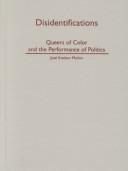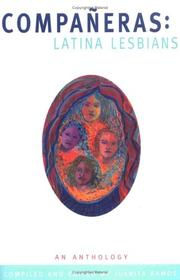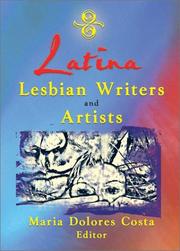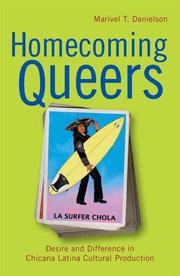| Listing 1 - 9 of 9 |
Sort by
|
Book
ISBN: 0813561973 9781461951940 1461951941 9780813561974 9780813561967 0813561965 9780813561950 0813561957 1306118204 Year: 2013 Publisher: New Brunswick, NJ
Abstract | Keywords | Export | Availability | Bookmark
 Loading...
Loading...Choose an application
- Reference Manager
- EndNote
- RefWorks (Direct export to RefWorks)
Amigas y Amantes (Friends and Lovers) explores the experiences of sexually nonconforming Latinas in the creation and maintenance of families. It is based on forty-two in-depth ethnographic interviews with women who identify as lesbian, bisexual, or queer (LBQ). Additionally, it draws from fourteen months of participant observation at LBQ Latina events that Katie L. Acosta conducted in 2007 and 2008 in a major northeast city. With this data, Acosta examines how LBQ Latinas manage loving relationships with the families who raised them, and with their partners, their children, and their friends. Acosta investigates how sexually nonconforming Latinas negotiate cultural expectations, combat compulsory heterosexuality, and reconcile tensions with their families. She offers a new way of thinking about the emotion work involved in everyday lives, which highlights the informal, sometimes invisible, labor required in preserving family ties. Acosta contends that the work LBQ Latinas take on to preserve connections with biological families, lovers, and children results in a unique way of doing family. Paying particular attention to the negotiations that LBQ Latinas undertake in an effort to maintain familial order, Amigas y Amantes explores how they understand femininity, how they negotiate their religious faiths, how they face the unique challenges of being in interracial/interethnic relationships, and how they raise their children while integrating their families of origin.
Hispanic American lesbians. --- Lesbian mothers. --- Lesbian parents --- Mothers --- Lesbians, Hispanic American --- Lesbians --- lesbian, bisexual and queer Latina family relationships.
Book
ISBN: 9780252053535 0252053532 9780252044533 9780252086601 Year: 2022 Publisher: Urbana : University of Illinois Press,
Abstract | Keywords | Export | Availability | Bookmark
 Loading...
Loading...Choose an application
- Reference Manager
- EndNote
- RefWorks (Direct export to RefWorks)
"Acts of remembering offer a path to decolonization for Indigenous peoples forcibly dislocated from their culture, knowledge, and land. Susy J. Zepeda highlights the often overlooked yet intertwined legacies of Chicana feminisms and queer decolonial theory through the work of select queer Indígena cultural producers and thinkers. By tracing the ancestries and silences of gender-nonconforming people of color, she addresses colonial forms of epistemic violence and methods of transformation, in particular spirit research. Zepeda also uses archival materials, raised ceremonial altars, and analysis of decolonial artwork in conjunction with oral histories to explore the matriarchal roots of Chicana/x and Latina/x feminisms. As she shows, these feminisms are forms of knowledge that people can remember through Indigenous-centered visual narratives, cultural wisdom, and spirit practices. A fascinating exploration of hidden Indígena histories and silences, Queering Mesoamerican Diasporas blends scholarship with spirit practices to reimagine the root work, dis/connection to land, and the political decolonization of Xicana/x peoples"--
Mexican American women --- Mexican American arts. --- Hispanic American lesbians --- Central American Americans --- Indian gays --- Feminism --- Decolonization --- Ethnic identity. --- Spiritual life. --- Psychology. --- Intellectual life. --- Social aspects --- United States --- Civilization --- Indian influences.

ISBN: 0816630143 0816630151 9780816630141 9780816630158 Year: 1999 Volume: v. 2 Publisher: Minneapolis, Minn. University of Minnesota Press
Abstract | Keywords | Export | Availability | Bookmark
 Loading...
Loading...Choose an application
- Reference Manager
- EndNote
- RefWorks (Direct export to RefWorks)
"There is more to identity than identifying with one's culture or standing solidly against it. Jos Esteban Munoz looks at how those outside the racial and sexual mainstream negotiate majority culture--not by aligning themselves with or against exclusionary works but rather by transforming these works for their own cultural purposes. Munoz calls this process disidentification, and through a study of its workings, he develops a new perspective on minority performance, survival, and activism. Disidentifications is also something of a performance in its own right, an attempt to fashion a queer world by working on, with, and against dominant ideology. By examining the process of identification in the work of filmmakers, performance artists, ethnographers, Cuban choteo, forms of gay male mass culture (such as pornography), museums, art photography, camp and drag, and television, Munoz persistently points to the intersecting and short-circuiting of identities and desires that result from misalignments with the cultural and ideological mainstream in contemporary urban America. Munoz calls attention to the world-making properties found in performances by queers of color--in Carmelita Tropicana's Camp/Choteo style politics, Marga Gomez's performances of queer childhood, Vaginal Creme Davis's Terrorist Drag, Isaac Julien's critical melancholia, Jean-Michel Basquiat's disidentification with Andy Warhol and pop art, Felix Gonzalez-Torres's performances of disidentity, and the political performance of Pedro Zamora, a person with AIDS, within the otherwise artificial environment of the MTV serial The Real World." --
Sociology of minorities --- Sociology of the family. Sociology of sexuality --- Sociology of culture --- United States --- Gays --- Hispanic American gays --- Hispanic American lesbians --- Lesbians --- Minority gays --- Minority lesbians --- Performance art --- Identity. --- Social conditions. --- Political aspects --- Theatrical science --- Identity --- Social conditions --- Arts, Modern --- Happenings (Art) --- Performing arts --- Lesbians, Hispanic American --- Gays, Hispanic American --- Ethnic lesbians --- Minority women --- Ethnic gays --- Minority gays - United States - Social conditions --- Minority lesbians - United States - Social conditions --- Hispanic American gays - Social conditions --- Hispanic American lesbians - Social conditions --- Gays - United States - Identity --- Lesbians - United States - Identity --- Performance art - Political aspects - United States --- United States of America --- Minority gay people --- Hispanic American gay people --- Gay people

ISBN: 0253212855 Year: 1999 Publisher: Bloomington Indiana University Press
Abstract | Keywords | Export | Availability | Bookmark
 Loading...
Loading...Choose an application
- Reference Manager
- EndNote
- RefWorks (Direct export to RefWorks)
Hispanic American drama (Spanish) --- Hispanic American lesbians. --- Hispanic American women in literature. --- Hispanic American women. --- Mexican American theater. --- Hispanic American drama (Spanish). --- Developmental psychology --- Theatrical science --- Sociology of minorities --- Sociology of the family. Sociology of sexuality --- anno 1900-1999 --- United States --- Latin America --- Sexology --- United States of America --- Homosexuality --- Identity --- Latinas --- Female homosexuality --- Theatre --- Book

ISBN: 0415909260 0415909252 1138173584 113596307X 1135963088 1280407034 0203900359 0415920981 Year: 1994 Publisher: New-York Routledge
Abstract | Keywords | Export | Availability | Bookmark
 Loading...
Loading...Choose an application
- Reference Manager
- EndNote
- RefWorks (Direct export to RefWorks)
Susan D. Moeller asks why international news has become tabloid in style and light on content - is this a response to audience demands, or does it create a particular sort of audience, one which has seen too much to care?
American literature --- Hispanic American lesbians --- Hispanic Americans --- Lesbians --- Lesbians' writings, American. --- Lesbians' writings, Hispanic American (Spanish). --- Hispanic American authors. --- Women authors. --- Sociology of the family. Sociology of sexuality --- Latin America --- Sexology --- Disasters. --- Sensationalism in journalism. --- Television broadcasting of news. --- War. --- Disasters --- War --- Television broadcasting of news --- Sensationalism in journalism --- Journalism --- Journalism & Communications --- Press coverage --- Homosexuality --- Female homosexuality --- Book --- Experiences --- -War --- -Television broadcasting of news --- -Sensationalism in journalism --- -Press coverage --- -Sociology of the family. Sociology of sexuality

ISBN: 0203057074 128388741X 1136569006 9781136569005 9781283887410 1560232781 9781560232780 156023279X 9781560232797 9780203057070 9781136569074 9781136569142 1136569073 Year: 2003 Publisher: Binghamton, NY Harrington Park Press
Abstract | Keywords | Export | Availability | Bookmark
 Loading...
Loading...Choose an application
- Reference Manager
- EndNote
- RefWorks (Direct export to RefWorks)
Explore a little-known side of the lesbian artistic world! With this book, you'll explore the work of the most significant contemporary Latina lesbian writers, artists, and performers in the United States, Latin America, and Spain. This book presents and analyzes literature, art, and poetry by women who, despite markedly different backgrounds and experiences, are all strongly influenced by the concept of lesbian identity. Latina Lesbian Writers and Artists begins with an essential A-to-Z overview of modern Latina lesbian authors and performers. From Cuban writer Magaly Alabau
Lesbians' writings, American --- American literature --- Spanish American literature --- Lesbians' writings, Spanish American --- Spanish literature --- Lesbians' writings, Spanish --- Hispanic American lesbians --- Lesbians --- Homosexuality and literature --- Women and literature --- Lesbian artists. --- Spanish American lesbians' writings --- English literature --- Agrarians (Group of writers) --- Literature and homosexuality --- Literature --- Female gays --- Female homosexuals --- Gay females --- Gay women --- Gayelles --- Gays, Female --- Homosexuals, Female --- Lesbian women --- Sapphists --- Women, Gay --- Women homosexuals --- Gays --- Women --- Lesbians, Hispanic American --- Spanish lesbians' writings --- Artists --- History and criticism. --- Hispanic American authors --- Women authors --- Intellectual life.
Book
ISBN: 1137560746 1137560738 Year: 2017 Publisher: New York, New York : Palgrave Macmillan,
Abstract | Keywords | Export | Availability | Bookmark
 Loading...
Loading...Choose an application
- Reference Manager
- EndNote
- RefWorks (Direct export to RefWorks)
This book utilizes personal narratives and survey data from over 1,100 respondents to explore the diversity of experiences across Latinx LGBT communities within the United States, including Puerto Rico. The authors document and celebrate many of the everyday strengths and strategies employed by this extraordinary population to navigate and negotiate their daily lives. Antonio (Jay) Pastrana, Jr. is an Associate Professor at John Jay College of Criminal Justice, CUNY, USA Juan Battle is a Professor of Sociology at the Graduate Center, CUNY, USA Angelique Harris is an Associate Professor of Sociology and Director of the Center for Gender and Sexualities Studies at Marquette University, USA.
Gay rights --- Gay and lesbian rights --- Gay men --- Gays --- Lesbian rights --- Lesbians --- Rights of gays --- Rights of lesbians --- Civil rights --- Social sciences. --- Ethnology. --- Sociology. --- Sex (Psychology). --- Gender expression. --- Gender identity. --- Social Sciences. --- Gender Studies. --- Sex identity (Gender identity) --- Sexual identity (Gender identity) --- Identity (Psychology) --- Sex (Psychology) --- Queer theory --- Expression, Gender --- Sex role --- Social theory --- Social sciences --- Cultural anthropology --- Ethnography --- Races of man --- Social anthropology --- Anthropology --- Human beings --- Behavioral sciences --- Human sciences --- Sciences, Social --- Social science --- Social studies --- Civilization --- Psychology, Sexual --- Sex --- Sexual behavior, Psychology of --- Sexual psychology --- Sensuality --- Psychological aspects --- Legal status, laws, etc. --- Hispanic American gays. --- Hispanic American lesbians.

ISBN: 0813548373 9780813548371 9780813545714 0813545714 9780813545721 0813545722 Year: 2009 Publisher: New Brunswick, NJ
Abstract | Keywords | Export | Availability | Bookmark
 Loading...
Loading...Choose an application
- Reference Manager
- EndNote
- RefWorks (Direct export to RefWorks)
Homecoming Queers provides a critical discussion of the multiple strategies used by queer Latina authors and artists in the United States to challenge silence and invisibility within mainstream media, literary canons, and theater spaces. Marivel T. Danielson's analysis reveals the extensive legacy of these cultural artists, including novelists, filmmakers, students and activists, comedians, performers, and playwrights. By clearly discussing the complexities and universalities of ethnic, racial, sexual, gender, and class intersections between queer Chicana and U.S. Latinas, Danielson explores the multiple ways identity shapes and shades creative expression. Weaknesses and gaps are revealed in the treatment of difference as a whole, within dominant and marginalized communities. Spanning multiple genres and forms, and including scholarly theory alongside performances, films, narratives, and testimonials, Homecoming Queers leads readers along a crucial path toward understanding and overcoming the silences that previously existed across these fields.
American literature -- Hispanic American authors -- History and criticism. --- American literature -- Women authors -- History and criticism. --- Hispanic Americans in the performing arts. --- Home in literature. --- Lesbians' writings, American -- History and criticism. --- American literature --- Lesbians' writings, American --- Home in literature --- Hispanic Americans in the performing arts --- Hispanic American lesbians --- Space in literature --- American Literature --- English --- Languages & Literatures --- Lesbians, Hispanic American --- Lesbians --- Performing arts --- English literature --- Agrarians (Group of writers) --- Hispanic American authors --- History and criticism --- Women authors --- Intellectual life --- Space in literature. --- History and criticism. --- Intellectual life.
Book
ISBN: 0814762719 0814760759 0814764924 Year: 2014 Publisher: New York, NY : New York University Press,
Abstract | Keywords | Export | Availability | Bookmark
 Loading...
Loading...Choose an application
- Reference Manager
- EndNote
- RefWorks (Direct export to RefWorks)
"Sexual Futures, Queer Gestures and Other Latina Longings proposes a theory of sexual politics that works in the interstices between radical queer desires and the urgency of transforming public policy, between utopian longings and everyday failures. Considering the ways in which bodily movement is assigned cultural meaning, Juana Mari;a Rodri;guez takes the stereotypes of the hyperbolically gestural queer Latina femme body as a starting point from which to discuss how gestures and forms of embodiment inform sexual pleasures and practices in the social realm. Centered on the sexuality of racialized queer female subjects, the book's varied archive--which includes burlesque border crossings, daddy play, pornography, sodomy laws, and sovereignty claims--seeks to bring to the fore alternative sexual practices and machinations that exist outside the sightlines of mainstream cosmopolitan gay male culture. Situating articulations of sexual subjectivity between the interpretive poles of law and performance, Rodri;guez argues that forms of agency continually mediate among these various structures of legibility--the rigid confines of the law and the imaginative possibilities of the performative. She reads the strategies of Puerto Rican activists working toward self-determination alongside sexual performances on stage, in commercial pornography, in multi-media installations, on the dance floor, and in the bedroom. Rodri;guez examines not only how projections of racialized sex erupt onto various discursive mediums but also how the confluence of racial and gendered anxieties seeps into the gestures and utterances of sexual acts, kinship structures, and activist practices. Ultimately, Sexual Futures, Queer Gestures, and Other Latina Longings reveals--in lyrical style and explicit detail--how sex has been deployed in contemporary queer communities in order to radically reconceptualize sexual politics"--
Sex --- Queer theory. --- Hispanic American lesbians. --- LAW --- SOCIAL SCIENCE --- Queer theory --- Lesbians, Hispanic American --- Lesbians --- Gender (Sex) --- Human beings --- Human sexuality --- Sex (Gender) --- Sexual behavior --- Sexual practices --- Sexuality --- Sexology --- Gender identity --- Behavioral sciences --- Human sciences --- Sciences, Social --- Social science --- Social studies --- Civilization --- Acts, Legislative --- Enactments, Legislative --- Laws (Statutes) --- Legislative acts --- Legislative enactments --- Jurisprudence --- Legislation --- Social aspects. --- Media & the Law. --- Anthropology --- Cultural. --- Gay Studies. --- Social aspects --- United States. --- ABŞ --- ABSh --- Ameerika Ühendriigid --- America (Republic) --- Amerika Birlăshmish Shtatlary --- Amerika Birlăşmi Ştatları --- Amerika Birlăşmiş Ştatları --- Amerika ka Kelenyalen Jamanaw --- Amerika Qūrama Shtattary --- Amerika Qŭshma Shtatlari --- Amerika Qushma Shtattary --- Amerika (Republic) --- Amerikai Egyesült Államok --- Amerikanʹ Veĭtʹsėndi︠a︡vks Shtattnė --- Amerikări Pĕrleshu̇llĕ Shtatsem --- Amerikas Forenede Stater --- Amerikayi Miatsʻyal Nahangner --- Ameriketako Estatu Batuak --- Amirika Carékat --- AQSh --- Ar. ha-B. --- Arhab --- Artsot ha-Berit --- Artzois Ha'bris --- Bí-kok --- Ē.P.A. --- EE.UU. --- Egyesült Államok --- ĒPA --- Estados Unidos --- Estados Unidos da América do Norte --- Estados Unidos de América --- Estaos Xuníos --- Estaos Xuníos d'América --- Estatos Unitos --- Estatos Unitos d'America --- Estats Units d'Amèrica --- Ètats-Unis d'Amèrica --- États-Unis d'Amérique --- Fareyniḳṭe Shṭaṭn --- Feriene Steaten --- Feriene Steaten fan Amearika --- Forente stater --- FS --- Hēnomenai Politeiai Amerikēs --- Hēnōmenes Politeies tēs Amerikēs --- Hiwsisayin Amerikayi Miatsʻeal Tērutʻiwnkʻ --- Istadus Unidus --- Jungtinės Amerikos valstybės --- Mei guo --- Mei-kuo --- Meiguo --- Mî-koet --- Miatsʻyal Nahangner --- Miguk --- Na Stàitean Aonaichte --- NSA --- S.U.A. --- SAD --- Saharat ʻAmērikā --- SASht --- Severo-Amerikanskie Shtaty --- Severo-Amerikanskie Soedinennye Shtaty --- Si︠e︡vero-Amerikanskīe Soedinennye Shtaty --- Sjedinjene Američke Države --- Soedinennye Shtaty Ameriki --- Soedinennye Shtaty Severnoĭ Ameriki --- Soedinennye Shtaty Si︠e︡vernoĭ Ameriki --- Spojené obce severoamerické --- Spojené staty americké --- SShA --- Stadoù-Unanet Amerika --- Stáit Aontaithe Mheiriceá --- Stany Zjednoczone --- Stati Uniti --- Stati Uniti d'America --- Stâts Unîts --- Stâts Unîts di Americhe --- Steatyn Unnaneysit --- Steatyn Unnaneysit America --- SUA (Stati Uniti d'America) --- Sŭedineni amerikanski shtati --- Sŭedinenite shtati --- Tetã peteĩ reko Amérikagua --- U.S. --- U.S.A. --- United States of America --- Unol Daleithiau --- Unol Daleithiau America --- Unuiĝintaj Ŝtatoj de Ameriko --- US --- USA --- Usono --- Vaeinigte Staatn --- Vaeinigte Staatn vo Amerika --- Vereinigte Staaten --- Vereinigte Staaten von Amerika --- Verenigde State van Amerika --- Verenigde Staten --- VS --- VSA --- Wááshindoon Bikéyah Ałhidadiidzooígíí --- Wilāyāt al-Muttaḥidah --- Wilāyāt al-Muttaḥidah al-Amirīkīyah --- Wilāyāt al-Muttaḥidah al-Amrīkīyah --- Yhdysvallat --- Yunaeted Stet --- Yunaeted Stet blong Amerika --- ZDA --- Združene države Amerike --- Zʹi︠e︡dnani Derz︠h︡avy Ameryky --- Zjadnośone staty Ameriki --- Zluchanyi︠a︡ Shtaty Ameryki --- Zlucheni Derz︠h︡avy --- ZSA --- Η.Π.Α. --- Ηνωμένες Πολιτείες της Αμερικής --- Америка (Republic) --- Американь Вейтьсэндявкс Штаттнэ --- Америкӑри Пӗрлешӳллӗ Штатсем --- САЩ --- Съединените щати --- Злучаныя Штаты Амерыкі --- ولايات المتحدة --- ولايات المتّحدة الأمريكيّة --- ولايات المتحدة الامريكية --- 미국 --- États-Unis --- É.-U. --- ÉU --- AB --- Amerikanʹ Veĭtʹsėndi͡avks Shtattn --- Saharat ʻAmērik --- Si͡evero-Amerikanskīe Soedinennye Shtaty --- Soedinennye Shtaty Si͡evernoĭ Ameriki --- Spojené obce severoamerick --- Spojené staty americk --- Stáit Aontaithe Mheirice --- SUA --- Wááshindoon Bikéyah Ałhidadiidzooígí --- Zʹi͡ednani Derz͡havy Ameryky --- Zluchanyi͡a Shtaty Ameryki --- Zlucheni Derz͡havy --- Amerikanʹ Veĭtʹsėndi͡avks Shtattnė
| Listing 1 - 9 of 9 |
Sort by
|

 Search
Search Feedback
Feedback About UniCat
About UniCat  Help
Help News
News